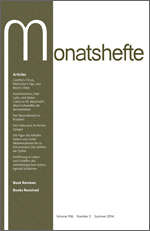|


|

View Online Edition
Subscribe Online
Activate Your Subscription
Sign up for email updates
Editorial Board
Back Issue TOC's
Advertising Rates
Artwork Guidelines
Index/Abstracts
Recommend Monatshefte
Submission Guidelines
Monatshefte 2017 Subscription Rates
Libraries & Institutions:
print & online $230
online only $198
Individuals:
print & online $90
online only $75
Non U.S. Postage (no postage charges for electronic only subscriptions)
Airmail: add $40/yr.
Canadian Subscribers: add 5% GST. |
Monatshefte
Volume 88, Number 4, Winter 1996 Table of Contents
Texts and Documents
Jürgen Kleist
Der neue Trick
Jürgen Kleist, born in Fürstenberg (Havel) in 1949, teaches German at the State University of New York, Plattsburgh, but lives in Burlington, VT. Apart from scholarly contributions, he has published poetry and prose in various magazines and anthologies; his much acclaimed novella Nietzsche in Turin appeared in Karlsruhe in 1992. Kleist is now preparing his first novel, Der Zauberer von Wien, for publication. His "Der neue Trick" is printed here for the first time. (RG) (In German)
Articles
Eric Denton
Satyr at Play: Goethe’s Satyros
Abstract:
In Satyros, the early Goethe reinvented satyr play, complete with the all the iconography and all the sexual and marital anxieties that accompany this mythological figure. The satyr is the counterpart to Prometheus and the hermit, two other figures that haunt Goethe’s early works. The satyr is also the most flamboyant of Goethe’s comic figures, simultaneous with his interest in Hanswurst and anticipating Mephistopheles. In satyr play, Goethe practices a healthy sense of self-parody and deflates his own “testicular” sentimentality. In terms of interreferentiality, Goethe borrows from Euripides, Apuleius. Aesop, Hans Sachs, Gessner, and Moli‚re: no anxiety of influence here. This essay concentrates on issues of satyric appearance, of diet, of agon, and of the abuse of hospitality. In the end, that abuse becomes a matter of desecration (the rejection of Christianity) and of cultural misrepresentation (the misappropriation of Greek antiquity). In Goethe’s hands, pre-nuptial rites become anti-nuptial farces. (ED)
Edward T. Larkin
Christian August Vulpius’ Rinaldo Rinaldini: Beyond Trivial Pursuit
Abstract:
The novel Rinaldo Rinaldini by Christian August Vulpius, Goethe’s largely-forgotten brother-in-law and author of over 140 works, was one of the most successful novels of its time. But its popularity does not preclude an instructive intention. Through a careful analysis of the issues treated in the novel, this essay demonstrates that an ethical approach to literature, typically reserved for canonical writers and works, can be productively applied to works of popular literature. In the case of Rinaldo Rinaldini the communicated ethic is one which is sympathetic to the developmental possibilities of the individual but which in the last analysis insists on the necessity of the individual’s integration into society. (ETL)
Klaus L. Berghahn
Weimarer Klassik + Jenaer Romantik = Europaeische Romantik?
Abstract:
In recent years, Weimar Classicism has again become the centerpiece of the canon in Germany. Its singularity, normativity, and timelessness are stressed, and classical Weimar seems to be used once more to constitute a German identity or even legitimize German reunification. This trend has led to criticism and has reopened the question whether Weimar Classicism and Jena Romanticism should be considered as one period which stretches from 1789 to 1815 and is located in the broader context of a European Romanticism, as comparatists have done for decades. After all, both share basic aesthetic and poetic concepts, and works of both periods fulfill the expectations of European Romanticism. But at the end of this short-lived debate, Weimar Classicism prevailed in splendid isolation. Perhaps it would be wiser to move away from these schematic and homogeneous representations of literary history and rediscover the complexity, heterogeneity, and uncertainty of history as reflected in literature. (KLB) (In German)
Peter Morris-Keitel
Nicht auf bessere Zeiten warten: Zu Robert Havemanns Vision eines Oekosozialismus
Abstract:
The article analyzes Robert Havemann’s (1910–82) work Morgen. Die Industriegesellschaft am Scheideweg. Kritik und reale Utopie (1982) from an ecological perspective, specifically within the context of eco-socialism. Havemann’s critique in the 1960s and 1970s of the consumerist and exploitative character of both market economy in the West and socialist economy in the East, as well as the report by the “Club of Rome,” The Limits to Growth (1972), must be understood as the basis for his ecological insights and his development of feasible alternatives to the impending ecological crisis. The article outlines Havemann’s contributions to the ecological movement in Germany and also discusses the validity of his concepts for the 1990s and beyond. (PMK) (In German)
Book Reviews
Notes
|

